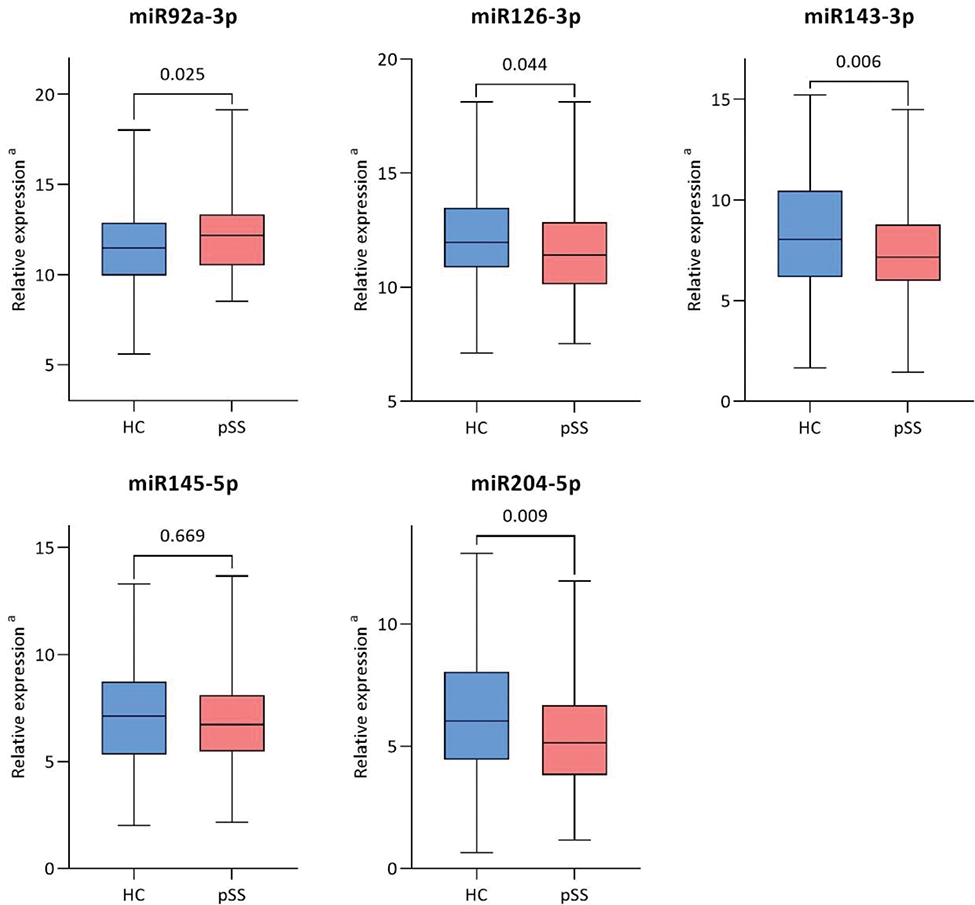

Background: Micro Ribonucleic acids, also known as microRNAs or miRs are critical regulators of gene expression that control various cell processes and disease progression. Their dysregulation is associated with various diseases, making them promising diagnostic and therapeutic targets. Among them, hsa-miR-92a-3p, hsa-miR-126-3p, hsa-miR-143-3p, hsa-miR-145-5p and hsa-miR-204-5p have been associated with endothelial function. However, their role in primary Sjögren’s syndrome (pSS) remains unexplored.
Objectives: Considering the increased cardiovascular risk in pSS patients, we aimed to investigate these miRNAs in the serum of pSS patients and correlate them with cardiovascular parameters and carotid intima-media thickness (cIMT) to evaluate their potential for risk stratification.
Methods: 199 patients with pSS and 100 age- and sex-matched controls were included in this prospective monocentric cohort study. Five different miRNAs known to be involved in cardiovascular disease (hsa-miR-92a-3p, hsa-miR-126-3p, hsa-miR143-3p, hsa-miR-145-5p and hsa-miR-204-5p) were analyzed in serum samples of all participants by quantitative real-time polymerase chain reaction (qRT-PCR). The miRNA results were compared with clinical and disease-related parameters.
Results: Four of the five miRNAs analyzed, showed significantly different expressions compared to healthy controls (HC). MiR-92a-3p was upregulated in pSS patients, while miR-126-3p, miR-143-3p and miR-204-5p were significantly reduced compared to HC´s. The comparison between HC´s and pSS patients with and without organ involvement showed slightly increased miR-92a-3p levels in pSS patients with organ involvement. Furthermore, miR-92a-3p levels correlated positively with cIMT, as an expression of subclinical atherosclerosis.
Conclusion: In conclusion, our study highlights the increased risk of endothelial inflammation in patients with pSS, as levels of potentially protective miRNAs (miR-126-3p, miR-143-3p and miR-204-5p) are reduced. In addition, miR-92a-3p may act as a potential biomarker for atherosclerosis and increased cardiovascular risk in pSS, as miR-92a-3p levels are elevated and correlate significantly with increased cIMT.
Comparison of miRNA levels in healthy controls (HC) and pSS patients. The line shows the median, the surrounding box displays the interquartile range, and the whiskers mark the minimum/maximum.
a normalized to c.elegans

REFERENCES: NIL.
Acknowledgements: NIL.
Disclosure of Interests: Nadine Zehrfeld received research grants by Novartis and financial support for conference attendance by Abbvie., Malin Abelmann was supported by the Family Felling Foundation., Sabrina Benz: None declared, Tabea Seeliger received a research grant by Novartis Pharma GmbH and received financial support for a conference attendance by Abbvie., Fiona Engelke: None declared, Thomas Skripuletz reports honoraria for lectures and travel grants from Alexion, Alnylam Pharmaceuticals, argenx, Bayer Vital, Biogen, Bristol Myers Squibb, Celgene, Centogene, CSL Behring, Euroimmun, Grifols, Hexal AG, Janssen-Cilag, Merck Serono, Novartis, Pfizer, Roche, Sanofi, Siemens, Sobi, Teva, Viatris. His research is supported by the German Ministry for Education and Research (BMBF: CurePML01EN2302), Bristol-Myers Squibb Foundation for Immuno-Oncology (FA 19-010), Claudia von Schilling Foundation for Breast Cancer Research, Else Kröner Fresenius Foundation, Hannover Biomedical Research School (HBRS), Alnylam Pharmaceuticals, CSL Behring, Novartis, Sanofi Genzyme, VHV Foundation., Christian Baer: None declared, Thomas Thum Thomas Thum is founder and shareholder of Cardior Pharmaceuticals GmbH., acknowledges funding from ERC Advanced Grant REVERSE, he filed and licenced patents in the field of RNA therapeutics and diagnostics., Torsten Witte received funding from the Deutsche Forschungsgemeinschaft (DFG, German Research Foundation) under Germany’s Excellence Strategy - EXC 2155 - project number 390874280.
Torsten Witte received honoraria for lectures by Abbvie, BMS, Chugai, Galapagos, Janssen, Lilly, Pfizer, UCB and Roche., Kristina Sonnenschein received presentation honoraria and travel grants from medi, Novartis, BMS and Chiesi., Diana Ernst received presentation honoraria from Abbvie, Amgen, BMS, Chugai, Cilag-Janssen, Galapagos, GSK, Medac, Lilly, Pfizer, Novartis, Roche and participated in advisory boards for Abbvie, Galapagos, Amgen and Novartis. Research grants by Novartis and Abbvie., Anselm Artur Derda was supported by PRACTIS – Clinician Scientist Program of Hannover Medical School, funded by the German Research Foundation (DFG, ME 3696/3–1).